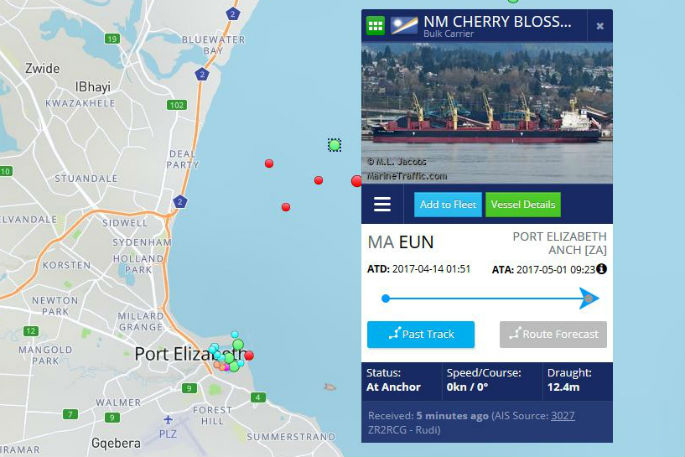Ongoing political issues behind a traditional supplier of phosphate rock for New Zealand fertiliser manufacturers are being exposed by the seizure of a fertiliser ship in Port Elizabeth, South Africa.
The Cherry Blossom is stuck at anchor 4km off Port Elizabeth, South Africa, and not allowed to continue on its journey to New Zealand.
The liberation movement of Western Sahara, Frente Polisario has intercepted and detained the shipment carrying $NZ7.5m worth of what Polisario calls conflict minerals bound for Ballance Agri-Nutrients' works at Awarua, Southland.
The mineral comes from Laayoune, in the Moroccan-controlled part of Western Sahara which has been under dispute since 1975 when war broke out between Morocco and the Polisario movement fighting for the Sahrawi people.
A lawyer for Polisario in Cape Town, Andre Bowley, says a court hearing over the cargo will be held on May 18.
Ballance CEO Mark Wynne says they will have a lawyer at the hearing, along with the ship's owners, charterers etc. But meanwhile, they have alternative supplies in train and southland farmers will not go short in spring.
The seizure is part of the region's ongoing turbulent politics, says Mark.
'The UN has been on the ground there for decades trying to resolve the conflict and get an enduring outcome between disagreeing parties.”
Western Sahara which in the past was partially annexed by Morocco, has recently rejoined the African Union, supported by Algeria, Nigeria and South Africa.
'South African regards Western Sahara as a country, the UN doesn't regard Western Sahara as a country.”
While Ballance Agri-Nutrients is caught up in the geo-politics, it's not ignoring or turning a blind eye to the situation.
Mark was in Western Sahara last year looking at the social aspects of the situation; jobs, education, and came away assured Ballance Agri-Nutrients is ethically as well as legally clear in continuing to source phosphate rock from the region.
Morocco has about 75 per cent of the world's rock phosphate, and Ballance has been a customer for 20 years, and it will continue to source out of that region, says Mark.
Most Moroccan phosphate is exported from further north, with only a small percentage exported from Laayoune
The bulk carrier Cherry Blossom was originally scheduled to arrive in Bluff, New Zealand, on May 30. The vessel is owned by the Greek company AM Nomikos Transworld Maritime.
Its current location can be tracked on the website Marinetraffic.
The Cherry Blossom called at Port Elizabeth for re-fuelling. It was during that operation that Western Sahara initiated legal proceedings against the vessel. A court order resulted in the detention of the cargo aboard the ship.
The Saharawi people have long protested what they say is the illegal mining and export of phosphate rock from that part of Western Sahara under armed occupation by Morocco since 1975.
The trade has continued despite the commitment of the United Nations in 1991 to oversee a self-determination referendum for the people of Western Sahara, a territory dealt with by the UN as Africa's last colonial issue.
"The export of these non-renewable resources from a place under armed occupation is a violation of well-settled principles of international law. It is a war crime,” says Saharawi representative for Australasia, Kamal Fadel.
"The resources need to stay in the ground until the Saharawi people are allowed the basic commitment of the international community to choose their future," says Fadel.
The seizure of the cargo under court order comes only months after Saharawi authorities successfully concluded a case against the European Union for extending a free trade agreement with Morocco into Western Sahara.
In the case, for which the Court of Justice of the European Union issued its final judgment on December 21 2016, the Court noted that Morocco did not have governing competency or any territorial claim to Western Sahara.
The territory, the Court concluded, is to be treated as a separate entity from Morocco and the consent of its people (the Saharawi people and not more recent settlers) required for development and export of resources.



1 comment
No Brainer.
Posted on 11-05-2017 14:28 | By morepork
Find alternative sources.
Leave a Comment
You must be logged in to make a comment.